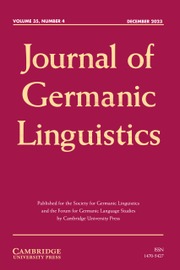No CrossRef data available.
Article contents
Word prosodic systems in the languages of Europe. Edited by Harry van der Hulst. (Empirical approaches to language typology, 20-4.) Berlin: Mouton de Gruyter, 1999. Pp. xxix, 1050. Hardcover. $274.00.
Published online by Cambridge University Press: 23 December 2002
Extract
Word prosodic systems in the languages of Europe (WPS), edited by van der Hulst, is the fourth in a nine-volume series titled EUROTYP, which is the twentieth work of the series “Empirical Approaches to Language Typology,” the aims of which are to put to use the intellectual capital of the European Union, and to catalog the characteristics of a European Sprachbund (vi).The reader who is curious as to why word level prosody should have a thousand pages devoted to it, and why it is the only remotely phonological topic of the nine EUROTYP topics indicating a Sprachbund and representative of the intellectual capital of Europe, will find by scanning the published papers from the Workshop on Typology of Languages in Europe (Bechert et al. 1990) that only one real reference to accent/intonation/stress appears in Bechert's (1990) article on nominal morphology. In short, WPS is about metrical structure. As such, WPS will be an influential resource to anyone working on prosody because metrical structure in general provides compelling empirical support to classical generative arguments in favor of an unconscious grammar and facilitates insight into other aspects of phonology (vowel length and tone placement, to note just two examples). Nespor reminds readers that although this book and topic are supposed to be limited to word level phenomena, the “word” domain has no privileged status with respect to prosody (117). That is, the principles of prosody do not begin or end with the word (although the notion of “word” holds social and pragmatic importance outside of the community of generative linguists). Thus, notions regarding word accent preclude antecedent notions about smaller and larger domains. Nevertheless, the task of metrical theory, and WPS specifically, is the elucidation of a simple notational device that can predict complex verbal behavior (Hayes 1982). This is in line with EUROTYP's purpose to “study the patterns and limits of variation” (v).
- Type
- REVIEWS
- Information
- Copyright
- © 2002 Society for Germanic Linguistics




